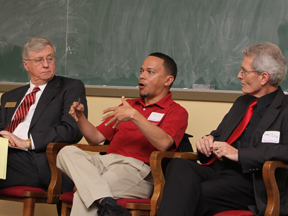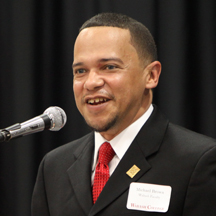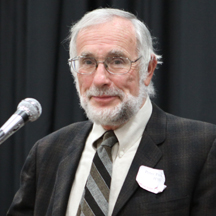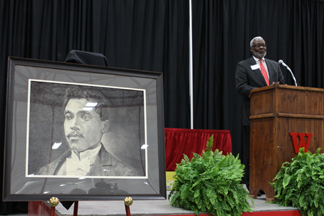The men of the Malcolm X Institute of Black Studies celebrated the Institute’s 40-year history and looked to its future with a series of presentations, panels, and video interviews that revealed the constant struggles and myriad accomplishments men of color have experienced at Wabash College.
More than 50 alumni members of the MXIBS, which was founded in 1971, returned to campus to recall the past and plan for the future under the leadership of Dr. Michael Brown, who is the Institute’s third director and also serves as Associate Dean of the College.
 “I think you men who have returned to campus have seen the same strengths here that gave your own lives meaning,” said President Patrick White in a Saturday morning discussion. “The kind of education that transformed your lives continues to this day. The MXI is a strong and important agent of that work and it will remain that way.”
“I think you men who have returned to campus have seen the same strengths here that gave your own lives meaning,” said President Patrick White in a Saturday morning discussion. “The kind of education that transformed your lives continues to this day. The MXI is a strong and important agent of that work and it will remain that way.”
Dr. Brown taught at Wabash for four years prior to an 11-year stint at Emory University, where he taught theology and religion and mentored graduate students. His return as the Institute’s new director has brought enthusiasm for the potential of the MXIBS to serve students of color — and the entire Wabash community.
Brown was praised by one of his former Wabash students, Luttrell Levingston ’98, who moderated a panel talk featuring Dr. Brown, President White, and Dean of the College Gary Phillips.
“Michael Brown’s relationship with Wabash didn’t end when he left the College,” Levingston said. “I can tell you that he has reached out to many of my friends to help them get their lives and careers straight. He has been a presence in our lives.”
Brown — and many other alumni, faculty, and administrators — spoke of the tension in which the Institute has existed since its founding. When it was developed, students hoped three important things would happen — a Black Studies program would emerge within the curriculum; more African Americans would be hired to faculty and staff positions; and African American students would have a place of their own on the campus.
 Since that time, Brown said, the Malcolm X Institute of Black Studies has lived in the tension between acting as a student center and academic center. “The MXI has lived in a creative, aspirational tension ever since it was founded,” Brown said. “The ambiguity in which it exists is a productive one.”
Since that time, Brown said, the Malcolm X Institute of Black Studies has lived in the tension between acting as a student center and academic center. “The MXI has lived in a creative, aspirational tension ever since it was founded,” Brown said. “The ambiguity in which it exists is a productive one.”
Dean Phillips said the MXIBS has always — and will continue — to play a critical role in the academic life of the College.
“Liberal arts work is about synergy between faculty and students, coaches and athletes, alumni and students, and faculty and staff,” Dean Phillips said. “We have to work together… Michael’s work — in collaboration with offices across the College — will ensure that every student has access to the people and programs that lead to success.”
A year-long program review led by an advisory committee working with current MXIBS members defined three ways the Institute could have a positive impact on the College: A continuing focus on student success, cultural enrichment, and community engagement.
“How do we form these young men while they are here so that they are prepared for the lives they will lead 20, 30, even 40 years from now,” Brown asked. “Empowerment is a big piece of that, and the MXI is a place where students develop and test their leadership skills.”
Dr. Brown also spoke broadly about cultural enrichment. “There is a difference between racial diversity and cultural diversity,” he said. “There are assumptions we grow up with as African Americans that are not challenged. Our students need to understand that there is a diversity not only in this country, but globally, and about what it means to grow up as a person of African descent.”
Keith Nelson ’71 was one of the Institute’s nine founders and was instrumental in organizing the 40th anniversary event.
“We had an idea and we called it the Malcolm X Institute of Black Studies,” Nelson said. “We had a responsibility to each other, for each other, and to our community. And through Black Studies, we learned about each other and taught each other.
“Malcolm X challenged us. He asked us, 'Who are we?' The name — Malcolm X Institute of Black Studies — was chosen to remind us of that challenge.”
 Dr. Peter Frederick, a 35-year member of the Wabash faculty who, with Professor Finley Campbell, helped students establish the Malcolm X Institute of Black Studies, was named an Honorary Alumnus in the Class of 1992 at Saturday’s banquet. Frederick recalled the meeting at which the students decided what to name the center.
Dr. Peter Frederick, a 35-year member of the Wabash faculty who, with Professor Finley Campbell, helped students establish the Malcolm X Institute of Black Studies, was named an Honorary Alumnus in the Class of 1992 at Saturday’s banquet. Frederick recalled the meeting at which the students decided what to name the center.
“The students went into the building to name it and chose Malcolm X Institute of Black Studies, which did not surprise me. We had been talking about Malcolm X and Dr. King… Malcolm talked about human rights. 'What kind of person will I be not just in this country, but in the larger world?' Malcolm was asking questions in a much larger context, and so the name made sense.”
President White noted that alumni have always been critical to the success of the Institute. “You MXI alumni are engaged in the mentoring of our students in formal programs and in informal ways,” the President said. “That alumni strength and loyalty is extraordinarily important to us. Chat Collier, Bob Wedgeworth, Kenyatta Brame, Keith Nelson, and Luttrell Levingston have been engaged, and it has intensified and become more pervasive in the last few years. And we sometimes need to remind ourselves that these things are not happening everywhere, but they are happening at Wabash.”
Wabash Trustee Robert Wedgeworth ’59 attended Wabash long before the Civil Rights Movement and the MXIBS, yet the former Dean of Library Science at both Columbia University and the University of Illinois has long been a supporter of the students.
“I was here before there was an Institute,” Wedgeworth said. “And I’ve always told you guys that I’ll have your backs. Just remember that things are different today than they were in my time. The Institute is always evolving.”
Looking backward and living forward became a theme for the weekend. And the tension of evolving the Institute to meet the needs of today’s students — while honoring its past — provided a useful tension to guide conversations. In some ways, that tension mirrors the tension of the Institute itself — student club or academic center, place of refuge or place of outreach, place of nurturing support or a place of strength and independence?
After receiving the Honorary Alumnus Award (read the citation here) from NAWM President Greg Castanias ’87, Frederick captured much of the sentiment of the weekend when he continued a mantra of “looking backward in order to live forward.”
“There’s an ambiguity and tension with the Institute… I see these current students and they are quality men with great potential and I listen to us struggle with a re-definition of what the Institute should be. And over time, when we have struggled like this, what have we done? We have trusted our students.
“This morning when we were talking about what’s in the center of the core of the Institute, and Terrance Pigues came right out and said, ‘Students!’”
 Wedgeworth provided two moments of excitement Saturday night. First, he unveiled a painting of Wabash’s first African American graduate, John Evans, which he and his wife, C.K., had commissioned. The piece will hang in the Institute.
Wedgeworth provided two moments of excitement Saturday night. First, he unveiled a painting of Wabash’s first African American graduate, John Evans, which he and his wife, C.K., had commissioned. The piece will hang in the Institute.
Moments later, Wedgeworth announced that he and C.K. had pledged $10,000 as seed money to establish the Horace Turner Fund at the Malcolm X Institute of Black Studies in honor of Turner, who directed the Institute for 35 years. He also said his family would match 50 percent of additional gifts from alumni with hopes of having a $40,000 fund by December 2012.
Seconds after Wedgeworth made the announcement, at least a dozen alumni rose to their feet shouting words of praise for Turner and about their experiences, and pledging money to grow the fund.
Turner had thanked the alumni earlier in the day when he said, “The 40-year history of the Institute would not have been possible without you alumni — you developed it, you sustained it.”
Keith Veal ’92, a frequent admissions and alumni volunteer for the College, put the 40-year history and hopes for the future in perspective when he suggested that each generation of students develops its own identity for the Institute.
“The Malcolm X Institute of Black Studies is always changing,” Veal said. “We need to define it and defend in our time.”